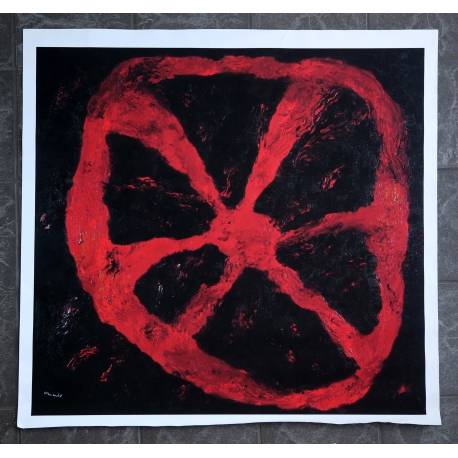Cart
0
(0)
No products
Artwork successfully added to your shopping cart
Quantity
Total
There are 0 items in your cart. There is 1 item in your cart.
Total
(tax incl.):
Armando - The Wheel - Giclée on canvas - hand signed
Armando
The Wheel
Giclée on canvas
Year: 2013
Hand-signed, numbered, and inscribed with e.a.
Edition: e.a.
Size: 107.5 × 106 cm
Condition: In good condition, slightly wavy, rolled
Armando, born Herman Dirk van Dodeweerd, spent his youth near Amersfoort, where the German occupiers established the police transit camp and later the Amersfoort concentration camp in 1938.
This experience had a lasting impact on his work: the themes of violence, guilt, forgetting, life, death, and time became central to his work.
From 1949 to 1954, the artist studied art history and philosophy at the University of Amsterdam. In 1958, Armando co-founded the "Nederlandse Informel Groep" and the "Gruppe Nul" (Group Zero), which emerged from it in 1960.
His early works are indebted to these groups, but also show affinities with the German "ZERO" movement. Armando works primarily in series. In the 1960s, his works became more object-like; the objects were mounted on panels and usually painted over in monochrome black.
After a three-year creative hiatus during which the artist explored early Romantic landscape painting theoretically, he returned to the expressiveness of his early works.
As a DAAD scholarship holder, Armando moved to Berlin in 1979. There, in 1980, he painted the series "Black Flags," which explored the question of guilt and the relationship between perpetrators and victims of National Socialism. Parallel to this, he created works in rapid succession that focused on the themes of life and death, with landscape motifs playing a decisive role.
The Neue Nationalgalerie was the first stop for a major traveling exhibition of Armando's works in 1984. Armando first explored the medium of sculpture in 1988, and since the early 1990s, his work has been characterized by an intensive engagement with music.
Armando passed away in 2018.
| Technique: | Giclée Print |
| Surface: | Canvas |
| Year: | 2013 |
| Country of Origin: | Germany |
| Signed: | hand signed |
| Time Period: | 21th Century |
| Total Size: | 107,5 x 106 cm |
| Primary Color: | Red |
| Secondary Color: | Black |
| Editions: | e.a. |








